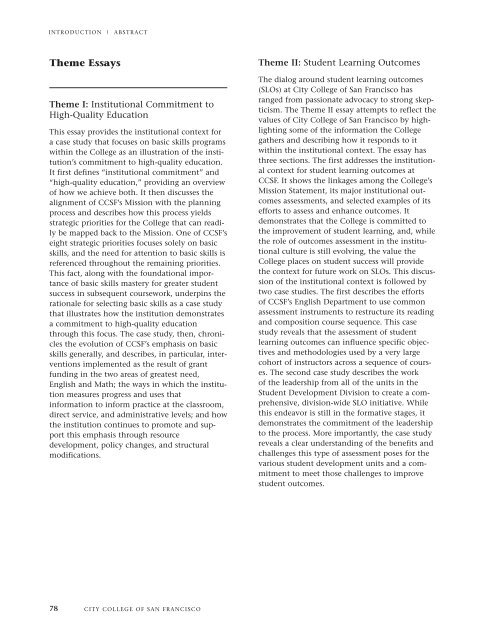City College of San Francisco - California Competes
City College of San Francisco - California Competes
City College of San Francisco - California Competes
Create successful ePaper yourself
Turn your PDF publications into a flip-book with our unique Google optimized e-Paper software.
INTRODUCTION | ABSTRACT<br />
Theme Essays<br />
Theme I: Institutional Commitment to<br />
High-Quality Education<br />
This essay provides the institutional context for<br />
a case study that focuses on basic skills programs<br />
within the <strong>College</strong> as an illustration <strong>of</strong> the institution’s<br />
commitment to high-quality education.<br />
It first defines “institutional commitment” and<br />
“high-quality education,” providing an overview<br />
<strong>of</strong> how we achieve both. It then discusses the<br />
alignment <strong>of</strong> CCSF’s Mission with the planning<br />
process and describes how this process yields<br />
strategic priorities for the <strong>College</strong> that can readily<br />
be mapped back to the Mission. One <strong>of</strong> CCSF’s<br />
eight strategic priorities focuses solely on basic<br />
skills, and the need for attention to basic skills is<br />
referenced throughout the remaining priorities.<br />
This fact, along with the foundational importance<br />
<strong>of</strong> basic skills mastery for greater student<br />
success in subsequent coursework, underpins the<br />
rationale for selecting basic skills as a case study<br />
that illustrates how the institution demonstrates<br />
a commitment to high-quality education<br />
through this focus. The case study, then, chronicles<br />
the evolution <strong>of</strong> CCSF’s emphasis on basic<br />
skills generally, and describes, in particular, interventions<br />
implemented as the result <strong>of</strong> grant<br />
funding in the two areas <strong>of</strong> greatest need,<br />
English and Math; the ways in which the institution<br />
measures progress and uses that<br />
information to inform practice at the classroom,<br />
direct service, and administrative levels; and how<br />
the institution continues to promote and support<br />
this emphasis through resource<br />
development, policy changes, and structural<br />
modifications.<br />
Theme II: Student Learning Outcomes<br />
The dialog around student learning outcomes<br />
(SLOs) at <strong>City</strong> <strong>College</strong> <strong>of</strong> <strong>San</strong> <strong>Francisco</strong> has<br />
ranged from passionate advocacy to strong skepticism.<br />
The Theme II essay attempts to reflect the<br />
values <strong>of</strong> <strong>City</strong> <strong>College</strong> <strong>of</strong> <strong>San</strong> <strong>Francisco</strong> by highlighting<br />
some <strong>of</strong> the information the <strong>College</strong><br />
gathers and describing how it responds to it<br />
within the institutional context. The essay has<br />
three sections. The first addresses the institutional<br />
context for student learning outcomes at<br />
CCSF. It shows the linkages among the <strong>College</strong>’s<br />
Mission Statement, its major institutional outcomes<br />
assessments, and selected examples <strong>of</strong> its<br />
efforts to assess and enhance outcomes. It<br />
demonstrates that the <strong>College</strong> is committed to<br />
the improvement <strong>of</strong> student learning, and, while<br />
the role <strong>of</strong> outcomes assessment in the institutional<br />
culture is still evolving, the value the<br />
<strong>College</strong> places on student success will provide<br />
the context for future work on SLOs. This discussion<br />
<strong>of</strong> the institutional context is followed by<br />
two case studies. The first describes the efforts<br />
<strong>of</strong> CCSF’s English Department to use common<br />
assessment instruments to restructure its reading<br />
and composition course sequence. This case<br />
study reveals that the assessment <strong>of</strong> student<br />
learning outcomes can influence specific objectives<br />
and methodologies used by a very large<br />
cohort <strong>of</strong> instructors across a sequence <strong>of</strong> courses.<br />
The second case study describes the work<br />
<strong>of</strong> the leadership from all <strong>of</strong> the units in the<br />
Student Development Division to create a comprehensive,<br />
division-wide SLO initiative. While<br />
this endeavor is still in the formative stages, it<br />
demonstrates the commitment <strong>of</strong> the leadership<br />
to the process. More importantly, the case study<br />
reveals a clear understanding <strong>of</strong> the benefits and<br />
challenges this type <strong>of</strong> assessment poses for the<br />
various student development units and a commitment<br />
to meet those challenges to improve<br />
student outcomes.<br />
78 CITY COLLEGE OF SAN FRANCISCO







